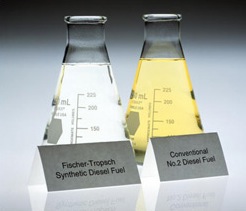Washington: The US could eliminate the need for crude oil by using a combination of coal, natural gas and non-food crops to make synthetic fuel, suggest American researchers.

The US could cut vehicle greenhouse emissions by as much as 50 percent in the next several decades using non-food crops to create liquid fuels, the researchers said.
Synthetic fuels would be an easy fit for the transportation system because they could be used directly in automobile engines and are almost identical to fuels refined from crude oil. That sets them apart from currently available bio-fuels, such as ethanol, which have to be mixed with gas or require special engines.
Christodoulos Floudas from Princeton University, along with graduate student Josephine Elia and Richard Baliban developed a comprehensive system for optimizing the production of synthetic liquid fuels as an economical replacement for petroleum-based fuels.
“The goal is to produce sufficient fuel and also to cut CO2 emissions or the equivalent by 50 percent,” said Floudas, professor of engineering and applied science.
“The question was not only can it be done, but also can it be done in an economically attractive way. The answer is affirmative in both cases,” Floudas said.
Accomplishing this would not be easy or quick, Floudas said. A realistic approach would call for a gradual implementation of synthetic fuel technology.
Floudas estimated it would take 30 to 40 years for the US to fully adopt synthetic fuel. It also would not be cheap. He estimates the price tag at roughly $1.1 trillion for the entire system.
The research makes up an important part of a white paper recently produced by the American Institute of Chemical Engineers (AIChE), the nation’s largest chemical engineering association.
In the paper, the chemical engineers call for a greater integration of energy sources and urge policymakers to consider chemical conversion processes as a potential method to produce cleaner and cheaper fuels.
“Right now we are going down so many energy paths,” said June Wispelwey, the institute’s director and a 1981 Princeton alumna. “There are ways for the system to be more integrated and much more efficient.”
The paper was written by Vern Weekman, one of Floudas’ co-researchers. Weekman, a lecturer at Princeton, is the former director of the Mobil Central Research Laboratories and a past president of AIChE.
– IANS
The opinions, beliefs and viewpoints expressed by authors, news service providers on this page do not necessarily reflect the opinions, beliefs and viewpoints of Hill Post. Any views or opinions are not intended to malign any religion, ethnic group, club, organization, company, or individual.
Hill Post makes no representations as to the accuracy or completeness of any information on this site page.



